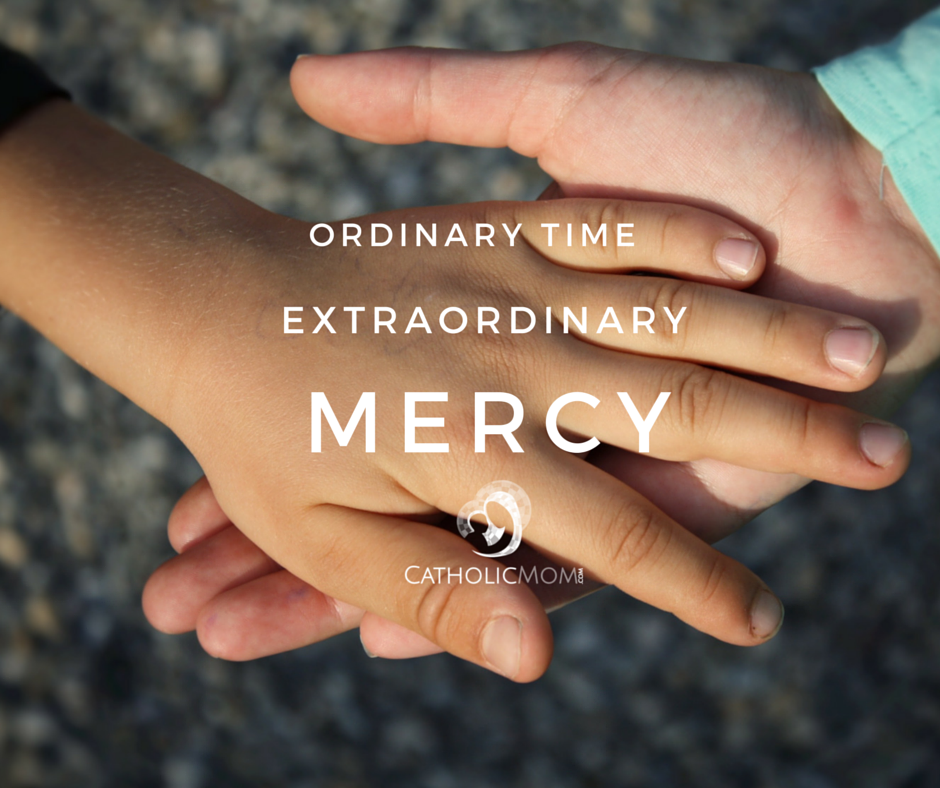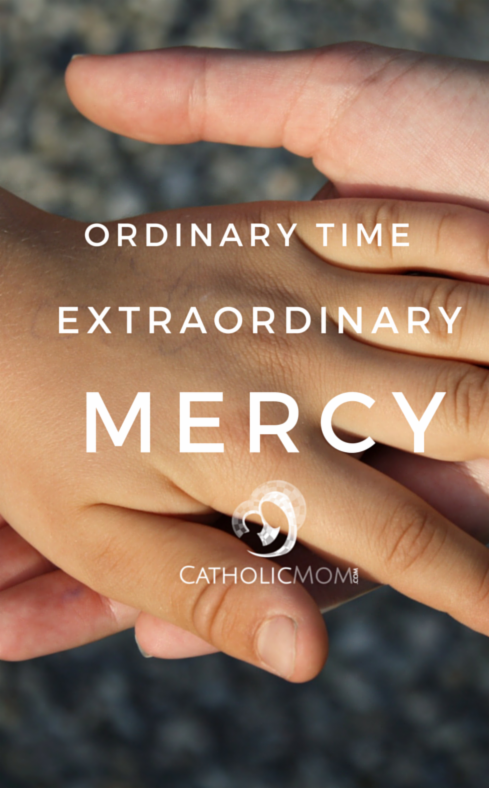
This post is part of our Ordinary Time, Extraordinary Mercy series, in which CatholicMom.com contributors will share their own experiences of living the Year of Mercy. Beginning at Pentecost and continuing through the summer, we'll cover many aspects of the Works of Mercy in family life.
When my family doesn’t immediately respond to my personal desires (often unreasonable desires), I jokingly console myself by saying we can choose our friends, but not our family.
That’s a little tricky when talking about in-laws. I mean, we do pick them, albeit indirectly. The in-laws fall into an in-between place. They aren’t quite family unless we want them to be, right?
But as far as relationships go in our lives, the in-laws are in the permanent landscape. Some of those relationships are very good. So good, in fact, we revel in the “family-ness” of them. Others can prove to be challenging, and the allure of avoiding contact or disassociating ourselves from those relationships tempts us. Some cases do require distance, but I’m not talking about those. You must use your best judgment in deciding what is unhealthy or even dangerous for your immediate family.
However, in the daily grind of getting on with the in-laws, what we’re looking at is a form of relationship-building that perhaps wasn’t in the plan when we first fell in love with our spouses. We married the one, and the rest came along as part of a package deal.
We want to get along. We ought to get along. Sometimes we just don’t get along.
Saying Lord have mercy, shaking our heads, and ignoring the problem doesn’t work.
But let’s backtrack a moment. Lord have mercy?
Perhaps we should look at that more closely. What is mercy if not love? And love, it seems, is what got us into this mess, isn’t it?
Love, charity, is at the heart of these relationships. We must remember the heart that got us there -- love for our spouse, of course, but let’s consider how that love is but an echo of a greater Love. Learning to love our in-laws is not only an act of charity, but an act of mercy. We are called to love, and when we love, we enjoy other benefits, fruits as the Catechism tells us:
The fruits of charity are joy, peace, and mercy; charity demands beneficence and fraternal correction; it is benevolence; it fosters reciprocity and remains disinterested and generous; it is friendship and communion: Love is itself the fulfillment of all our works. There is the goal; that is why we run: we run toward it, and once we reach it, in it we shall find rest. 1829
Why mercy?
Because nothing opens our hearts like mercy.
When we think of mercy, we tend to look outward, as something we offer to others. We are the ones who want to instruct, or console, or forgive. We are the ones who take food to shelters and clothes to centers. We are the ones who bear wrongs patiently. Sometimes, we say these in-law relationships are a cross we must bear.
Perhaps we are the ones most in need of mercy.
When we look to Christ on the cross, we can know it is His mercy that saves us. He is the source of all mercy and forgiveness.
Because we are in need of His mercy.
When we understand our own deep need for mercy, we may be able to offer it more charitably. I often pray this simple prayer when faced with persons I find difficult to love:
Lord Jesus Christ, Son of God, have mercy on me, a sinner.
I find that when I say that prayer sincerely, it opens my heart to a more loving response. I can’t change how others treat me, but I can change how I respond to others. Perhaps. Maybe. Is it possible that I could be contributing to the difficult relationship?
The prayer doesn’t fix the problem, but it adjusts my outlook. Difficult people continue to be difficult for whatever collection of reasons they have, but I can choose to engage differently, knowing that I, too, need a measure of mercy.
It is Christ who first offers us mercy. We are all sinners in need of redemption, and no matter our suffering, in it is Christ where we will find solace.
"I am Love and Mercy Itself. There is no misery that could be a match for My mercy, neither will misery exhaust it, because as it is being granted — it increases. The soul that trusts in My mercy is most fortunate, because I Myself take care of it" -Jesus, Divine Mercy in My Soul (Diary Entry, 1273).
We can choose to face these difficult relationships with mercy, modeling the mercy given us. We can turn it over to Jesus, in his mercy. It might not change the offending or hurtful relationships. It might not change behaviors. It might, in fact, be more difficult. But it’s the right thing to do. It’s the loving thing to do. It’s what Jesus asks us to do.
[Tweet "We can choose to face difficult relationships with #mercy, modeling the mercy given us. @bego #OTEM"]
Try some of these steps to help you grow in mercy
- Pray for your spouse. Those are your spouse’s first relationships. Respect them.
- Pray for your in-laws.
- Be kind.
- Be inclusive when you can.
- Go to Adoration frequently -- place your suffering at the foot of the cross.
Read the other articles in our "Ordinary Time, Extraordinary Mercy" series.
Copyright 2016 Maria Morera Johnson
Image: Canva
About the Author

Maria Morera Johnson
Maria Morera Johnson, author of My Badass Book of Saints, Super Girls and Halo, and Our Lady of Charity: How a Cuban Devotion to Mary Helped Me Grow in Faith and Love writes about all the things that she loves. A cradle Catholic, she struggles with living in the world but not being of it, and blogs about those successes and failures, too.




.png?width=1806&height=731&name=CatholicMom_hcfm_logo1_pos_871c_2728c%20(002).png)
Comments